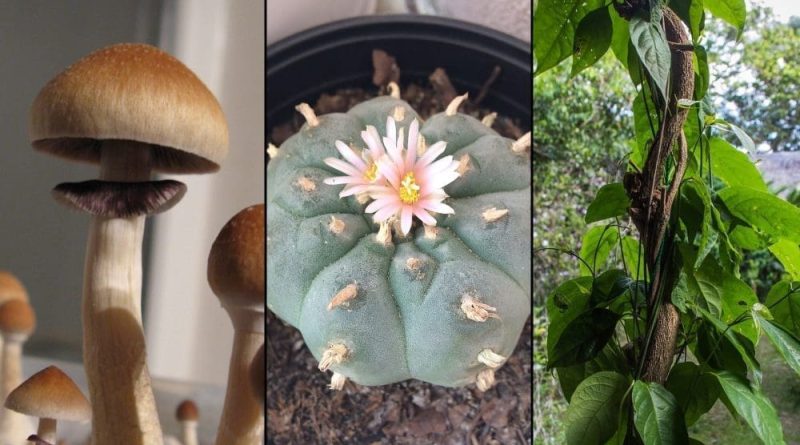Psychedelics Lead To ‘Improvements In Anxiety And Depression During Global Crisis Times’ Like COVID Pandemic, Study Shows
From toxifillers.com with love
People who used psychedelics during the peak of the COVID-19 pandemic showed “improvements in mental health,” supporting the idea that “beneficial effects on mood and anxiety associated with these substances may extend beyond controlled conditions” that can also apply in moments of “global crisis,” according to a new study.
Researchers at Imperial College London set out to investigate how the use of various drugs impacted mental health outcomes amid the pandemic, drawing on survey data from UK residents from 2019 to 2022.
On average, people who consumed drugs “had worse average mental health scores relative to drug-naive individuals at all timepoints,” the study found. But people who used psychedelics and marijuana “showed average improvements in depression, anxiety and overall mental health from pre-pandemic to January 2022, becoming on par with the drug-naive group.”
Interestingly, the study, which received support from the UK government-funded National Institute for Health Research, said those improvements did not appear for “cannabis-only users, whose worse mental health scores persisted.”
“Those who used psychedelics may have experienced some improvements in mental health across the pandemic timeframe, which supports the idea that beneficial effects on mood and anxiety associated with these substances may extend beyond controlled conditions,” the study authors said.
The findings were based on surveys involving 377,678 respondents between December 2019 and March 2022. They were disaggregated into six clusters: People who used cannabis only, cannabis and cocaine, cocaine only, psychedelics and cannabis, poly-drug and no drugs.
“Naturalistic use of psychedelics is associated with longitudinal improvements in anxiety and depression during global crisis times.”
“Mental health in most drug use clusters remained stable over time, except for the psychedelics and cannabis cluster,” the study found. “At follow-up, this cluster showed significant within-subject improvements. Comparing pre-restrictions data to January 2022, individuals in this group had significantly worse depression and mental health composite scores than drug-naive individuals at baseline, but these differences diminished over time, with no significant differences relative to drug-naive individuals remaining at follow-up.”
“Anxiety scores also dropped significantly in this cluster, though the differences from drug-naive individuals did not reach statistical significance at either baseline or follow-up,” it said. “Further analyses suggest this might be due to individuals in this cluster generally using fewer drugs by January 2022 relative to their pre-pandemic baseline. By contrast, cannabis-only users consistently showed poorer mental health across all symptoms compared to drug-naive individuals, suggesting the change in mental health scores might be related to the additional use of psychedelics within that cluster.”
The researchers said the observation on psychedelics “accords with previous findings that link naturalistic use of psychedelics to improved mental health.”
The study also lays out “several pertinent explanations” for the trend.
“At the population level, drug users have worse mental health than drug-naive individuals–and it could be that (novel) use of psychedelics, albeit less drug use more generally, during crisis times, normalises those differences,” it says. “Another possible explanation is that the context is more influential in driving the effects of psychedelics than it is in driving the effects of other drugs.”
There are limitations to the study, however. including the fact that it was “fully automated online” so researchers “did not conduct the sorts of interviews that are sometimes used to provide comprehensive baseline data on participants’ drug use histories, which limits our ability to assess the influence of prior drug use on mental health.”
“For instance, we did not collect data pertaining to dosage, frequency or context of drug use, which are likely important in determining mental health outcomes, nor have we gathered specific information on other drugs individuals may use in the UK, such as amphetamines,” they said.
“Future research should investigate whether the observed changes in mental health within the psychedelics and cannabis cluster are driven by alterations in the use of cannabis, psychedelics or their combined effects, particularly given their prevalent concurrent use; or whether they are a product of other synergistic or independent factors (such as the quality of interpersonal relationships, concurrent treatment for mood disorders or lifestyle changes),” the study concludes.
Meanwhile, another recent study found that taking a high dose of LSD, coupled with assisted therapy, led to “greater reductions in depression” among patients compared to those who received a low dose of the psychedelic.
A separate scientific review on psychedelics as a possible treatment for substance use disorders found that psilocybin-assisted psychotherapy “showed significant reductions in alcohol consumption and high smoking cessation rates” and has potential to lessen opioid dependence.
In 2023, meanwhile, the National Institute on Drug Abuse (NIDA) announced a $1.5 million funding round to further study psychedelics and addiction.
Other recent research has also suggested that psychedelics could unlock promising new pathways to treat addiction. A first-of-its-kind analysis in 2023 offered novel insights into exactly how psychedelic-assisted therapy works for people with alcohol use disorder.
Last year, meanwhile, the National Center for Complementary and Integrative Health (NCCIH), which is part of the National Institutes of Health, identified the treatment of alcohol use disorder as one of a number of possible benefits of psilocybin, despite the substance remaining a Schedule I controlled substance under U.S. law.
The agency highlighted a 2022 study that “suggested that psilocybin may be helpful for alcohol use disorder.” The research found people who were in psilocybin-assisted therapy had fewer heavy-drinking days over 32 weeks than the control group, which NCCIH said “suggests that psilocybin may be helpful for alcohol use disorder.”
High Doses Of LSD Lead To ‘Greater Reductions In Depression’ Compared To Low Doses Of The Psychedelic, New Study Finds
Photo elements courtesy of carlosemmaskype and Apollo.


